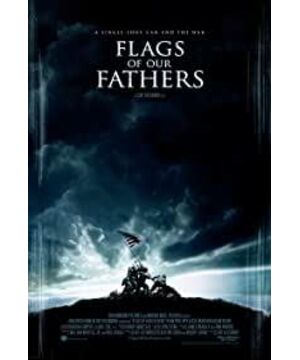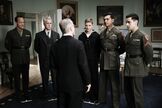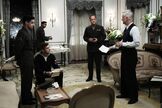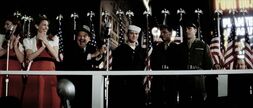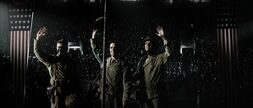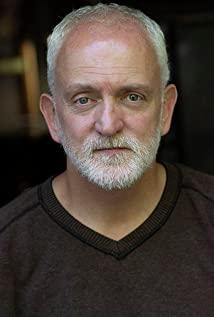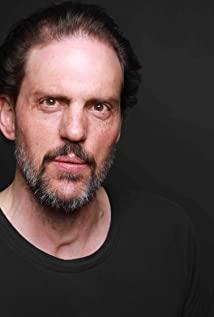Some people say that Director Dongmu's father's banner is too messy and talks too much. But from this two-hour and 12-minute film, what moved me most from beginning to end was the deep sympathy I had for an ordinary U.S. Marine who participated in the Battle of Iwo Jima and the Pacific War.
Of course, when it comes to making a war film, he has accomplished the purpose of a war film very well, and never whitewashes war. But when we talk about war, intentionally or unintentionally, and usually we tend to unequally distribute the weight between the grand narrative and the individual's mental journey, too much emphasis on the big things, and ignoring each individual. I think a good war movie should at least show humane care for individual soldiers.
So this kind of care shown in this film is not like some superficial films, which only stop at the cruelty of war's brutal physical trauma to a person. He cleverly took advantage of the historical event in the Battle of Iwo Jima that the U.S. military used flag-trees to promote war bonds, and used the news media to complicate the matter, especially in this historical context, where three Marines The different responses shown, on another level, represent the different forms of damage to a soldier in a war.
He used a soldier's most primitive instinct to escape on the battlefield and his helplessness to life and death, coupled with the honor of heroism madly promoted by the media, the innate contradiction between the two will inevitably have a psychological impact on a soldier. harm. In particular, it will deepen its level of self-doubt, and many of them, like the Indian soldier, have a more intense reaction.
I think if a director is willing to talk about this matter and talk about it from this angle, it will be a great and unusual thing.
I have been watching movies related to World War II recently, including some film and television dramas, such as the Pacific War. From a large perspective, these war movies are all about the cruelty of the battlefield. This is what we want to watch, and it is described in great detail. But it is rarely used to dismantle the meaning of war, the meaning of war to an individual, and the meaning of war to a country, from the perspective of a sober bystander.
It's not that the banner of the father's generation talks about these so-called meanings in a particularly in-depth way. It's just that this film narrates the events back and forth back and forth, which is more reflective and reflective, and this kind of narration is not It will be bland and give people a kind of aesthetic fatigue.
The cinematography and soundtrack in the film are also generous, and the final picture is frozen in the marines with the soldiers planting the flag swimming in the sea, which clearly shows that there are no heroes at all. If war is a good time to create heroes, it would be better to say that war is a period when heroes have to be needed.
In fact, we are always too constrained by the term hero, and the term meaning represents different things, but if we think about it again, we remove the irony of heroes, those added by the media, the so-called Glory, those Soldiers just did something that was not against their conscience. The three players who became heroes are just lucky to have the labels that politicians put on them and the fame that the media wrote for them.
But I have to say that the hero does not represent these three people, it represents a group, a concept and a spirit. If you put him in such a broad sense, I think people's attitude towards heroes in the film is still open to question. Heroes are not just used to sell excited feelings, but to let you have a kind of care for them from the heart, a A kind of empathy, a kind of sympathy, you don't even need to learn from them, you just need to be close to them, that is, to maintain a minimum continuous respect.
After watching so many war movies, I'm ashamed that I'm now sitting on it without worry. Those fathers who gave their lives in the war years never talked about the war. They didn't want us to forget it, but they didn't want to let the cruelty of the war to them, its own cruelty, and the imperfection of that era, let us He polluted the age of his children. But I believe that an era always has the value of an era. The war has tested humanity and humanity, but the conscience, conscience, kindness, and love that have existed since the beginning of mankind have never disappeared. The flags of our fathers are not the patriotism that is silent among the politicians, nor is it the fanatical cannon fire reflected in the eyes of the militants. The flags of the fathers are actions that do not violate the conscience, preserve the most primitive kindness of mankind, and ardently support it. belief in life.
This is a flag that should always be flown.
View more about Flags of Our Fathers reviews


